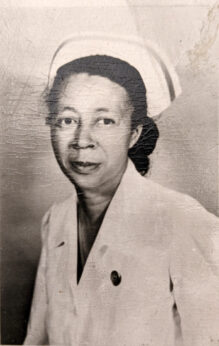
For eight decades, Etta Furlow lived a life filled with struggle and achievements, culminating in a long list of accomplishments. She was known in the community as “Queen Mother” for her tireless efforts in fighting for the rights of African Americans, women, and the working class in Minnesota.

She was recognized by the NAACP, St. Paul Urban League, AFL-CIO, and the Minnesota Nurses’s Association for her work in the labor and civil rights movements. This outstanding leader received the Rosa Parks Award on Feb. 27, 1983, in commemoration of Black History Month for her “aggressive articulation of racist and unjust practices on local, state, and national issues.” And in the 1980s, the City of St. Paul, declared “Etta Furlow Day” in her honor.
Born in 1910 in Missouri, Furlow moved to Chicago in the 1940s to pursue her studies in nursing. Having received a certificate for massage and physical therapy in 1947, she would become a licensed practical nurse in the state of Illinois in 1959. Upon achieving her diploma, she moved to St. Paul in 1960 with her husband, James Furlow, to work in an integrated hospital. During this period, this groundbreaking African American leader also transitioned into the role of labor organizer, leading the fight to integrate the Minnesota Practical Nurses Association, the predecessor of the Minnesota Licensed Practical Nurses Association (MLPNA).
A fierce advocate for Black women, she used her position as a labor leader to fight against segregation and for respect and unity in the nurses union. As she continued the struggle into her later years, Furrow discussed concerns over the excessive pressure placed on women for waged labor and the increased competition among women in the workplace. “A situation which polarizes rather than unites women is not progress,” she said.
Having worked as a pediatric nurse for many of her professional years, Furlow also held in high esteem “reproductive labor”— the work women do that is life-sustaining: domestic work and raising children, keeping themselves, their families, and others healthy, safe, fed, clean, cared for, and thriving. In other words, the labor leader deeply valued the essential work that capitalism tends not to acknowledge or compensate. “The world depends on women, and women depend on each other,” she stated.
Etta and James Furlow were foster parents, and their work at home mirrored the social justice work they did in the community. The couple frequently had nieces and nephews staying with them whom she helped raise. Her home was the after-school gathering spot for children on her block who might not have had anywhere else to go. In her position as Education Chairperson for the Minnesota Licensed Practical Nurses Association, Furlow worked unremittingly to get a child abuse protection law passed in the state. And it was she who organized the first seminar on the subject of child abuse in Minnesota in 1973.
Etta Furlow understood that under capitalism, cooperation, and collectivity are neglected and replaced by individualism, which places a higher importance on material consumption than on health, community, and well-being.
As a foster mother, a community mother, and “Queen Mother,” she valued time for true connections with people over “token stuff,” as she put it. “Toys and trips are no substitute for love. The only thing anybody really needs is food, shelter, warmth, participation, and recognition.”

The respected community leader also promoted participation and recognition for seniors of color in her work with the Metropolitan Council’s Minority Issues Advisory Committee and the Metropolitan Council’s Advisory Commission for the Aging. In these roles, she arranged for homebound senior residents to attend the Minnesota state fair and helped to organize a voter registration drive specifically targeting seniors.
Furlow’s rich tapestry of lived experiences led her to storytelling. In the 1980s, she was involved in a storytelling group called Whispers, composed of older women. A play based on her life, entitled Etta, was written and performed at the Guthrie Theater, a center for theater performance, production, and education in Minneapolis. “We all have a story to tell,” the play’s original protagonist explained.
Etta Furlow was a member of the Communist Party USA’s Bill Herron Club in St. Paul until her passing. Party members there have many fond memories of her. They recall how “Queen Mother” would frequently be seen with other party leaders like novelist Meridel Le Sueur reading books and passing out political pamphlets and Marxist literature at the Paul Robeson Bookstore in the Dinkytown neighborhood of Minneapolis. “I strive to get along with folks here on earth,” she concluded.












Comments